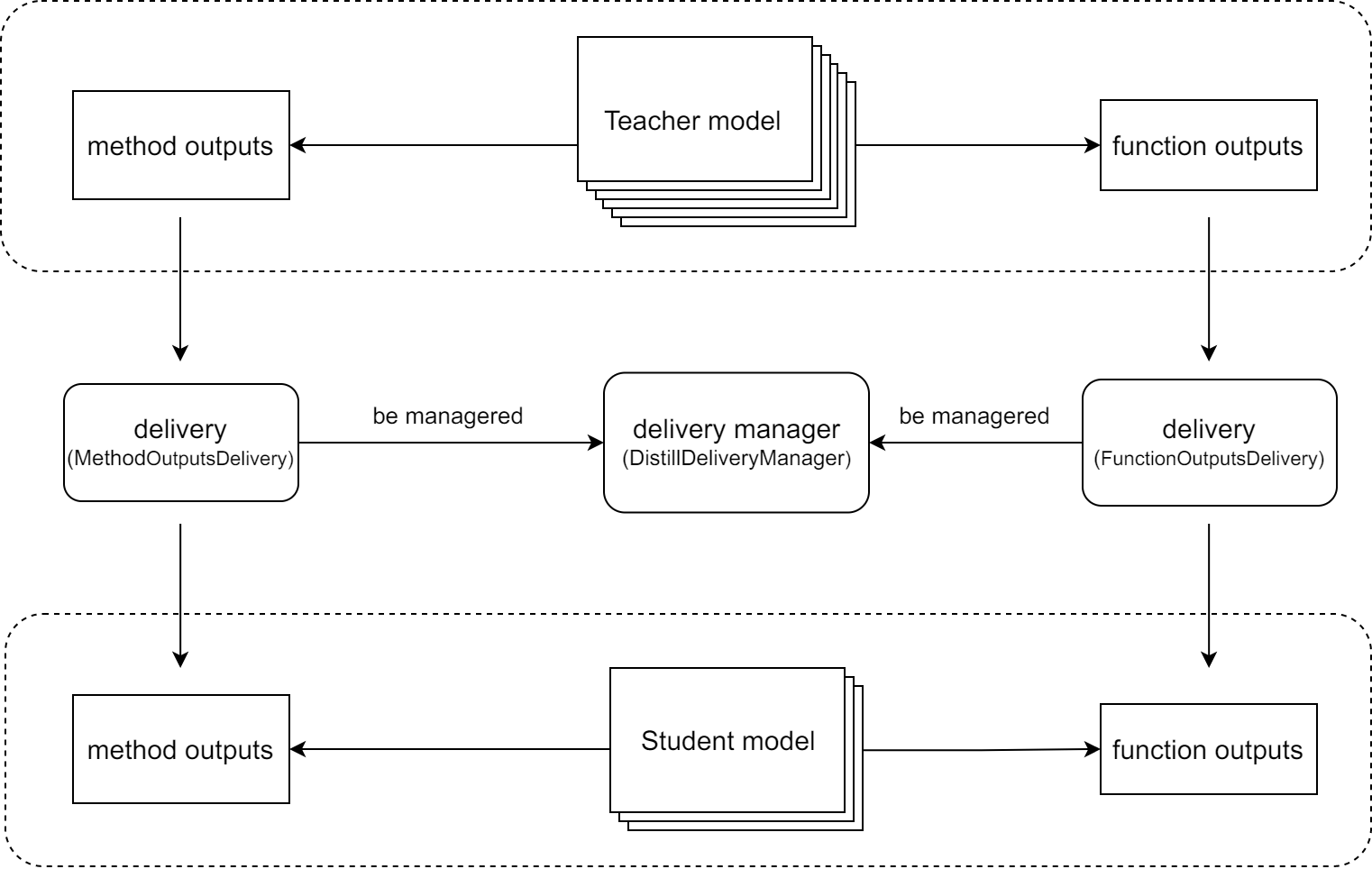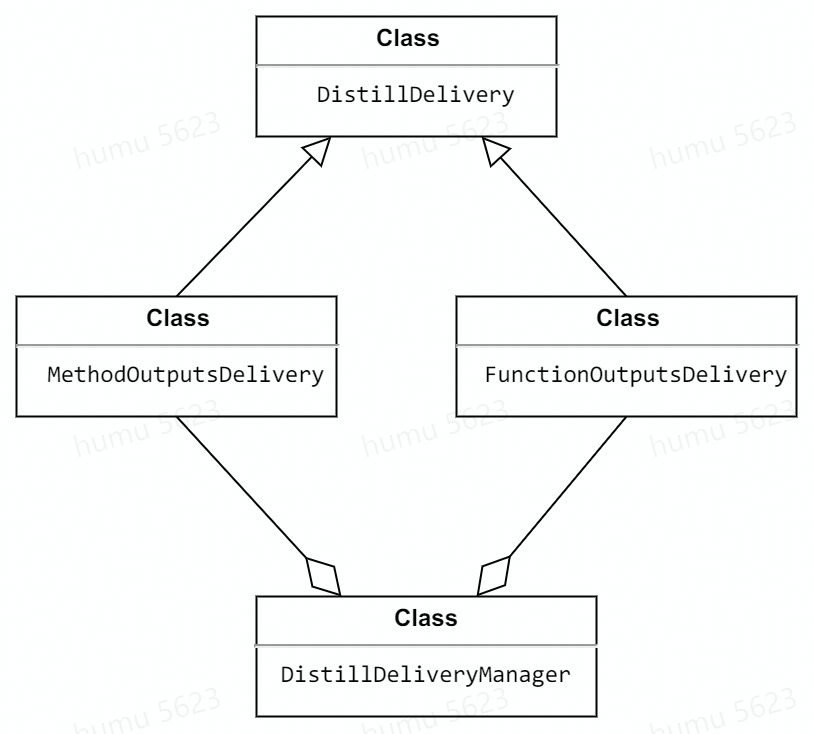7.3 KiB
Delivery
Introduction of Delivery
Delivery is a mechanism used in knowledge distillation, which is to align the intermediate results between the teacher model and the student model by delivering and rewriting these intermediate results between them. As shown in the figure below, deliveries can be used to:
- Deliver the output of a layer of the teacher model directly to a layer of the student model. In some knowledge distillation algorithms, we may need to deliver the output of a layer of the teacher model to the student model directly. For example, in LAD algorithm, the student model needs to obtain the label assignment of the teacher model directly.
- Align the inputs of the teacher model and the student model. For example, in the MMClassification framework, some widely used data augmentations such as mixup and CutMix are not implemented in Data Pipelines but in
forward_train, and due to the randomness of these data augmentation methods, it may lead to a gap between the input of the teacher model and the student model.
In general, the delivery mechanism allows us to deliver intermediate results between the teacher model and the student model without adding additional code, which reduces the hard coding in the source code.
Usage of Delivery
Currently, we support two deliveries: FunctionOutputsDelivery and MethodOutputsDelivery, both of which inherit from DistillDiliver. And these deliveries can be managed by DistillDeliveryManager or just be used on their own.
Their relationship is shown below.
FunctionOutputsDelivery
FunctionOutputsDelivery is used to align the function's intermediate results between the teacher model and the student model.
When initializing `FunctionOutputsDelivery`, you need to pass `func_path` argument, which requires extra attention. For example,
`anchor_inside_flags` is a function in mmdetection to check whether the
anchors are inside the border. This function is in
`mmdet/core/anchor/utils.py` and used in
`mmdet/models/dense_heads/anchor_head`. Then the `func_path` should be
`mmdet.models.dense_heads.anchor_head.anchor_inside_flags` but not
`mmdet.core.anchor.utils.anchor_inside_flags`.
Case 1: Delivery single function's output from the teacher to the student.
import random
from mmrazor.core import FunctionOutputsDelivery
def toy_func() -> int:
return random.randint(0, 1000000)
delivery = FunctionOutputsDelivery(max_keep_data=1, func_path='toy_module.toy_func')
# override_data is False, which means that not override the data with
# the recorded data. So it will get the original output of toy_func
# in teacher model, and it is also recorded to be deliveried to the student.
delivery.override_data = False
with delivery:
output_teacher = toy_module.toy_func()
# override_data is True, which means that override the data with
# the recorded data, so it will get the output of toy_func
# in teacher model rather than the student's.
delivery.override_data = True
with delivery:
output_student = toy_module.toy_func()
print(output_teacher == output_student)
Out:
True
Case 2: Delivery multi function's outputs from the teacher to the student.
If a function is executed more than once during the forward of the teacher model, all the outputs of this function will be used to override function outputs from the student model
Delivery order is first-in first-out.
delivery = FunctionOutputsDelivery(
max_keep_data=2, func_path='toy_module.toy_func')
delivery.override_data = False
with delivery:
output1_teacher = toy_module.toy_func()
output2_teacher = toy_module.toy_func()
delivery.override_data = True
with delivery:
output1_student = toy_module.toy_func()
output2_student = toy_module.toy_func()
print(output1_teacher == output1_student and output2_teacher == output2_student)
Out:
True
MethodOutputsDelivery
MethodOutputsDelivery is used to align the method's intermediate results between the teacher model and the student model.
Case: Align the inputs of the teacher model and the student model
Here we use mixup as an example to show how to align the inputs of the teacher model and the student model.
- Without Delivery
# main.py
from mmcls.models.utils import Augments
from mmrazor.core import MethodOutputsDelivery
augments_cfg = dict(type='BatchMixup', alpha=1., num_classes=10, prob=1.0)
augments = Augments(augments_cfg)
imgs = torch.randn(2, 3, 32, 32)
label = torch.randint(0, 10, (2,))
imgs_teacher, label_teacher = augments(imgs, label)
imgs_student, label_student = augments(imgs, label)
print(torch.equal(label_teacher, label_student))
print(torch.equal(imgs_teacher, imgs_student))
Out:
False
False
from mmcls.models.utils import Augments
from mmrazor.core import DistillDeliveryManager
The results are different due to the randomness of mixup.
- With Delivery
delivery = MethodOutputsDelivery(
max_keep_data=1, method_path='mmcls.models.utils.Augments.__call__')
delivery.override_data = False
with delivery:
imgs_teacher, label_teacher = augments(imgs, label)
delivery.override_data = True
with delivery:
imgs_student, label_student = augments(imgs, label)
print(torch.equal(label_teacher, label_student))
print(torch.equal(imgs_teacher, imgs_student))
Out:
True
True
The randomness is eliminated by using MethodOutputsDelivery.
2.3 DistillDeliveryManager
DistillDeliveryManager is actually a context manager, used to manage delivers. When entering the DistillDeliveryManager, all delivers managed will be started.
With the help of DistillDeliveryManager, we are able to manage several different DistillDeliveries with as little code as possible, thereby reducing the possibility of errors.
Case: Manager deliveries with DistillDeliveryManager
from mmcls.models.utils import Augments
from mmrazor.core import DistillDeliveryManager
augments_cfg = dict(type='BatchMixup', alpha=1., num_classes=10, prob=1.0)
augments = Augments(augments_cfg)
distill_deliveries = [
ConfigDict(type='MethodOutputs', max_keep_data=1,
method_path='mmcls.models.utils.Augments.__call__')]
# instantiate DistillDeliveryManager
manager = DistillDeliveryManager(distill_deliveries)
imgs = torch.randn(2, 3, 32, 32)
label = torch.randint(0, 10, (2,))
manager.override_data = False
with manager:
imgs_teacher, label_teacher = augments(imgs, label)
manager.override_data = True
with manager:
imgs_student, label_student = augments(imgs, label)
print(torch.equal(label_teacher, label_student))
print(torch.equal(imgs_teacher, imgs_student))
Out:
True
True
Reference
123
